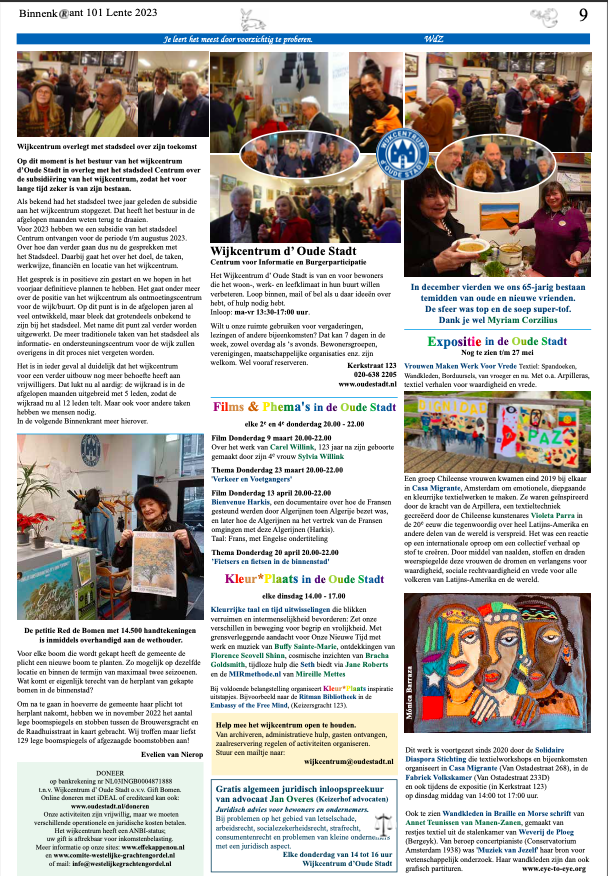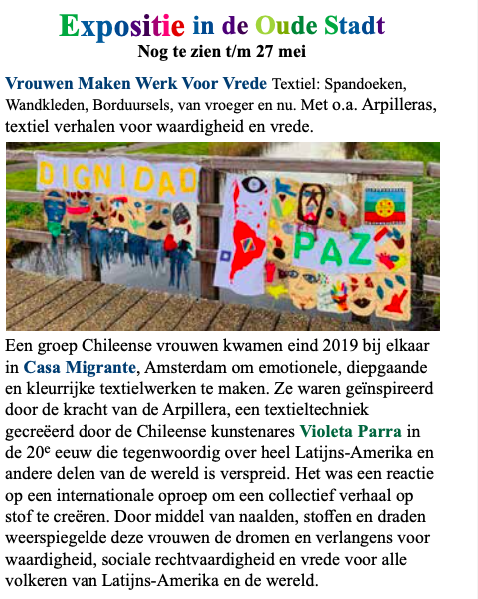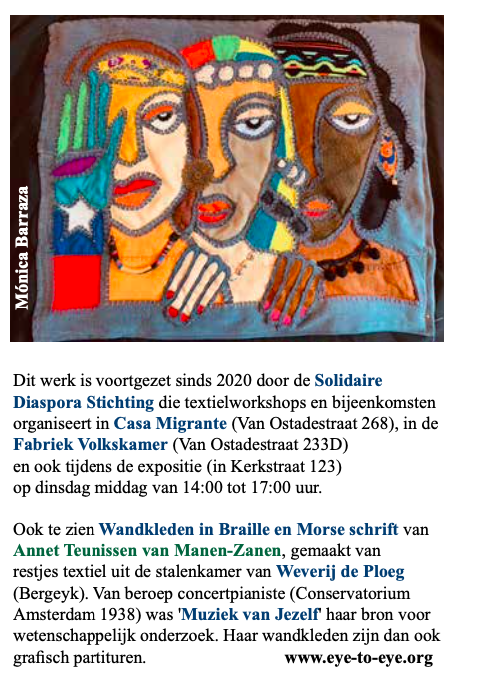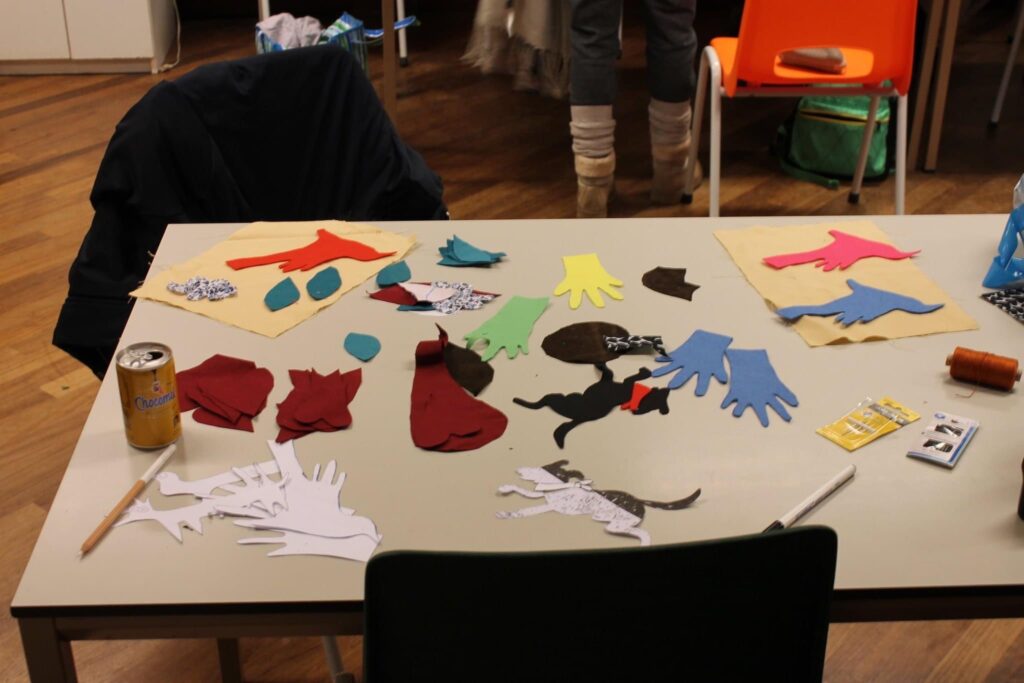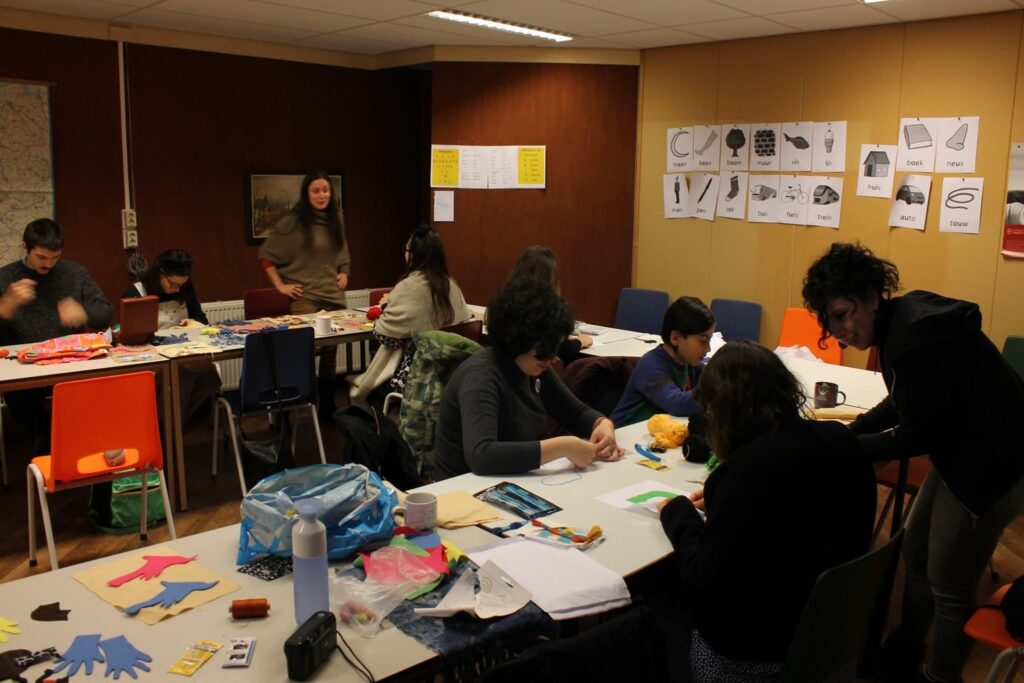Exposición de arte textil “Mujeres trabajando por la paz”.
El Centro cultural Het Wijkcentrum d’Oude Stadt nos ha invitado a formar parte de su exposición textil “Mujeres trabajando por la paz”, con el relato textil “Justicia, Dignidad y Paz”(1), que un grupo de chilenas y chilenos tejimos colectivamente, el 07 de diciembre de 2019, en Casa Migrante Amsterdam, manifestándonos en apoyo a las y los ciudadanos chilenos, víctimas del uso desmedido de la fuerza y el irrespeto a los Derechos Humanos que estaban cometiendo agentes del Estado Chileno contra la población, durante Estallido Social de octubre de ese año y los meses que le siguieron, que dejó decenas de muertos, cientos de víctimas de la violencia estatal y sexual, más de 500 personas heridas con daños oculares irreversibles, y cientos de encarcelamientos injustificados o desproporcionado de manifestantes.
Esta exposición también contará con algunos trabajos textiles que hemos continuado haciendo en los encuentros de arpilleras organizados por nuestra Fundación, con los que promovemos la asociatividad, la integración y la creatividad de mujeres y disidencias Latinoamericanas e Hispanohablantes, en Países Bajos.
¿Dónde verla? En Het Wijkcentrum d’Oude Stadt, Kerkstraat 123, 1017 GE Amsterdam.
¿Cuándo? Desde el 6 de marzo hasta el 27 de mayo de 2023. Acceso gratuito.
La exposición organizada por el centro cultural Het Wijkcentrum d’Oude Stadt, cuenta también con la colaboración de Casa Migrante Amsterdam.
Más información sobre la exposición disponible en el siguiente enlace: Binnenkrant 101 lente 2023.
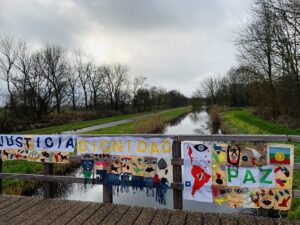
(1) “Justicia, Paz y Dignidad”, fueron las palabras escogidas espontáneamente por un grupo de personas reunidas en diciembre de 2019, en Casa Migrante, Ámsterdam, para confeccionar este emotivo relato textil colectivo, con el que nos sumamos desde Países Bajos, a la convocatoria internacional de activismo textil «Mil agujas por la dignidad» de la artista visual chilena, Karen Rosentreter.
Con él, manifestamos nuestra gran preocupación por las graves y sistemáticas violaciones a los Derechos Humanos (DD.HH) que estaban cometiendo agentes del estado Chileno contra la población, tras el estallido social del 18 de octubre de 2019 (acreditadas y documentadas por los principales organismos internacionales DD.HH), entregamos nuestro apoyo y convocamos la solidaridad internacional para exigir la restitución del Estado de Derecho y el respeto los Derechos Humanos en Chile.
Este encuentro tuvo lugar el 07 de diciembre de 2029, organizado en Países Bajos por la artista visual Mak Álvarez (artmak.cl), el Colectivo @Chile Despertó Holanda, y por nosotras, en lo que sería el inicio de nuestra colectiva @Fundación Diáspora Solidaria, realizándose en Casa Migrante Amsterdam.
Desde el 2020, continuamos el trabajo de activismo y colectivismo textil, ofreciendo talleres y encuentros que hemos organizado como Fundación, para promover la asociatividad, la creatividad, la integración y el empoderamiento de las mujeres y disidentes latinoamericanas e hispanohablantes en Holanda, inspirándonos en la Arpillera, por el poder de su narrativa, así como por la relación histórica que esta técnica tiene con la defensa de los Derechos Humanos.
¿Qué es una Arpillera?
El nombre Arpillera (o jute) se refiere a un tipo de género, que se ocupa generalmente para envolver harina o trigo. Fue tomado como canva por primera vez por Violeta Parra, una de las más grandes artistas chilenas de la historia, cerca del año 1960. Ella nombró arpillera al trabajo textil que resultó de su creativa, expresiva y autodidacta forma de bordarlas. Pronto, la técnica fue enriquecida de las manos de las «Bordadoras de Isla Negra», un colectivo de mujeres bordadoras de esta localidad costera de Chile.
A mediados de los años 70, las Arpilleras adquirieron un valioso valor testimonial y se convirtieron en verdaderos «periódicos textiles», contando la verdad sobre la defensa de la vida, la búsqueda de la verdad y la justicia, por parte de la Asociación de Familiares los miles de Detenidos Desaparecidos de la dictadura militar de Pinochet (1973-1990), atreviéndose a contar lo que los medios oficiales no querían contar. Hoy, esta técnica se extiende y enriquece por toda América Latina, desde Chile a México, de la mano de activos colectivos de mujeres, bordadoras y difusoras, que siguen tejiendo historias, contando sus vivencias, sus sueños, su resistencia y luchas, así como sus anhelos de dignidad, igualdad, justicia social y paz.
Más información sobre nuestros Talleres de Arpilleras, aquí.
English version
Textile art exhibition «Women working for peace».
The cultural center Het Wijkcentrum d’Oude Stadt has invited us to be part of their textile exhibition «Women working for peace», with the textile work «Justice, Dignity and Peace»(1), that a group of Chilean women and men weaved collectively, in December 2019, in Casa Migrante Amsterdam, demonstrating for the restitution of the rule of law, after knowing of the serious human rights violations committed by agents of the Chilean State against the population during the Social Outbreak of October of that year and the months that followed, which left dozens of people dead, hundreds of victims of state and sexual violence, more than 500 people with irreversible eye injuries, and hundreds of imprisonments of protesters.
This art exhibition will also include some of the textile works that we have continued to make in the Arpilleras Workshops organised by our Foundation, with which we promote the associativity, integration and creativity of Latin American and Spanish-speaking women and dissidents in the Netherlands.
Where to see it? At Het Wijkcentrum d’Oude Stadt, Kerkstraat 123, 1017 GE Amsterdam.
When will it take place? From March 6 to May 27, 2023. Free admission.
The exhibition is organised by the cultural centre Het Wijkcentrum d’Oude Stadt, in collaboration with Casa Migrante Amsterdam.
(1) «Justice, Peace and Dignity», were the words chosen spontaneously by a group of people who gathered on December 7th, 2019, in Casa Migrante, Amsterdam, to make this emotional collective textile story, with which we joined from the Netherlands to the international call for textile activism «A thousand needles for dignity» of the Chilean visual artist, Karen Rosentreter.
With it, we express our big concern for the serious and systematic violations of Human Rights (HR) being committed by agents of the Chilean state against the population, after the social outbreak of October 18, 2019 (accredited and documented by major international human rights organisations), we give our support and call for international solidarity to demand the restoration of the rule of law and respect for human rights in Chile.
This meeting was organised in the Netherlands, at Casa Migrante Amsterdam, by visual artist Mak Alvarez (artmak.cl), the Collective @Chile Despertó Holanda, and by us, in what was the beginning of our collective @Fundación Diáspora Solidaria.
Since 2020, we have continued the work of activism and textile collectivism, offering workshops, encounters and meetings as a Foundation, to promote associativity, creativity, integration and empowerment of Latin American and Spanish-speaking women and dissidents in the Netherlands, inspired by the Arpillera, for the power of its narrative, as well as the historical relationship that this technique has with the defence of Human Rights.
¿What is an Arpillera?
The Arpillera (or jute) refers to a type of cloth, usually used to wrap flour or wheat. It was first taken as a canva by Violeta Parra, one of the greatest Chilean artists in history, around 1960. She named the textile work that resulted from her creative, expressive and self-taught embroidery arpillera. Soon, the technique was enriched by the hands of the «Bordadoras de Isla Negra», a collective of women embroiderers from this coastal town in Chile.
In the mid 70’s the Arpilleras became true “Textil newspapers” that told the truth which the official media did not want to tell, about the search for truth, justice and the defence of life, by the Association of Families of the Detained-Disappeared of the civil-military dictatorship of Pinochet (1973-1980).
Currently, this technique has been disseminated and enriched throughout Latin America, by the hand of women’s collectives and artists who continue to weave stories, narrating their experiences, dreams and desires for dignity, equality, social justice and respect for nature, promoting peace with needles, fabrics and threads.
More information about our Arpilleras Workshops, here.

